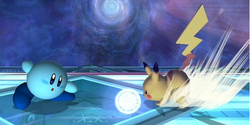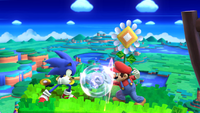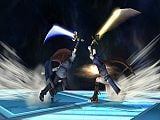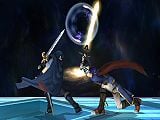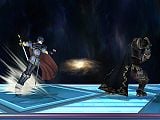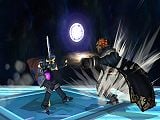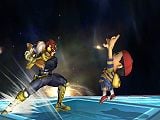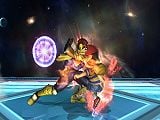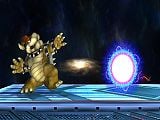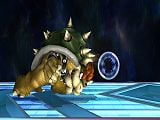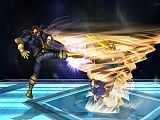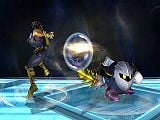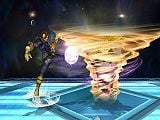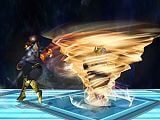Priority: Difference between revisions
SacredFire37 (talk | contribs) m (→Attacks with transcendent priority: Updated so that it shows that zss dash attack is transcendent in all 3 games) Tag: Mobile edit |
(Updated for SSB4/SSBU Zelda) |
||
| (27 intermediate revisions by 17 users not shown) | |||
| Line 1: | Line 1: | ||
{{ArticleIcons|series=y|unofficial=yes|fa=yes}} | {{ArticleIcons|series=y|unofficial=yes|fa=yes}} | ||
{{disambig2|priority in relation to attacks|controller slot priority|Port priority}} | {{disambig2|priority in relation to attacks|controller slot priority|Port priority}} | ||
[[File:Jab cancel.png|250px | [[File:Jab cancel.png|250px|thumb|The white "bubble" between {{SSBB|Kirby}} and {{SSBB|Pikachu}}'s attacks indicates that two hitboxes have collided.]] | ||
'''Priority''' is | '''Priority''' is the system that governs how opposing [[attack]]s interact with each other in the ''{{b|Super Smash Bros.|series}}'' series. Most commonly, when the [[hitbox]]es of two characters' attacks collide with each other, they '''clank''', freezing both in place for a moment. If the attacks are roughly equal in strength - the difference in damage is 9% or less - then both characters '''rebound''' from the impact and pause for a moment before they can do anything else. If one attack is much stronger than the other, it wins outright, and more often than not will continue on to strike the enemy stuck rebounding. The most common exception is [[aerial attack]]s, which usually can clank with [[projectile]]s, but not with [[ground attack]]s or other aerials, and cannot rebound at all. Certain hitboxes are also marked as being "cannot clank" or "cannot rebound", affecting their ability to cancel out (and be cancelled out by) opposing moves. | ||
While the effects of priority are calculated based on individual hitboxes, the results are applied to the attacker as a whole. For example, if one hitbox clanks with an enemy attack, the entire move clanks, regardless of how many other hitboxes would not have clanked. In addition, an attack that clanks is still dangerous to bystanders until rebound begins, even if it was entirely outprioritized by the opposing attack. | |||
The term "priority" is often informally used to describe a move's general ability to beat other moves, due to factors such as its damage output, hitbox position, attack speed, non-vulnerable [[hurtbox]]es, or other properties. | |||
==Normal priority== | ==Normal priority== | ||
[[File:WindyHillSSB4.png|thumb|{{SSB4|Mario}}'s [[Fireball]] colliding with {{SSB4|Sonic}}'s [[neutral attack]] in {{forwiiu}}.]] | [[File:WindyHillSSB4.png|thumb|{{SSB4|Mario}}'s [[Fireball]] colliding with {{SSB4|Sonic}}'s [[neutral attack]] in {{forwiiu}}.]] | ||
''Normal priority'' describes the set of rules that apply to normal attack hitboxes, that is, any attack hitbox that | ''Normal priority'' describes the set of rules that apply to normal attack hitboxes, that is, any attack hitbox that does not have a special property such as ''transcendent'' or ''trample''. As such, the majority of standard attacks, aerials, special attacks, and projectiles contain hitboxes with ''normal priority''. | ||
===Ground attacks | ===Ground attacks=== | ||
When two ground attack hitboxes overlap, they will clank. This collision is signified by a white "bubble", and in ''[[Super Smash Bros. Melee|Melee]]'', a distinct "ting" sound, as if swords are clanging, is also heard. If two actual swords clank, such as Link and Marth's blades, a more realistic "ting" sound is heard. If the stronger hitbox (by %) deals more than 9% (the "priority range") more than the weaker hitbox, the stronger move will continue as normal and the weaker move will end, with the character going into rebound. If both hitboxes deal within 9% of each other, both moves will end and both characters will go into rebound. (note that in the original ''[[Super Smash Bros.]]'', the priority range is instead 10%). This comparison happens after most damage multipliers but before the 1v1 multiplier in ''[[Super Smash Bros. Ultimate|Ultimate]]''. | |||
In Melee, the weaker hitbox won't hit the opponent if it clanks. However, the stronger hit can still hit the user of the weaker hit immediately, or on the following frames. In Ultimate, however, neither player can be hit by the clanking opponent '''on the frame that the clank occurs'''. If the stronger move continues, it can hit the clanking opponent on the following frame, assuming the move still has a hitbox on that frame. | |||
For example: | For example: | ||
*In ''Brawl'', if {{SSBB|Marth}}'s un-tipped forward smash collides with {{SSBB|Ike}}'s forward smash (14% vs. 22%), | *In ''Brawl'', if {{SSBB|Marth}}'s un-tipped forward smash collides with {{SSBB|Ike}}'s forward smash (14% vs. 22%), both moves will end and both characters will go through rebound. | ||
*However, if Marth's un-tipped forward smash collides with {{SSBB|Ganondorf}}'s forward smash (14% vs. 24%), Ganondorf's forward smash will | *However, if Marth's un-tipped forward smash collides with {{SSBB|Ganondorf}}'s forward smash (14% vs. 24%), Ganondorf's forward smash will continue and may hit Marth as Marth rebounds. | ||
*If {{SSBB|Captain Falcon}}'s forward smash collides with {{SSBB|Ness}}' up tilt (19% vs. 7%), Captain Falcon's forward smash will | *If {{SSBB|Captain Falcon}}'s forward smash collides with {{SSBB|Ness}}' up tilt (19% vs. 7%), Captain Falcon's forward smash will continue and hit Ness as Ness starts to rebound. | ||
===Rebound=== | |||
Depending on the relative strength of the ground moves, either one or both characters will go through rebound. | |||
First, a rebounding character will suffer freeze frames equal to the hitlag of the '''stronger''' attack (by %). This is true whether the user of the stronger attack goes through rebound or not. During these freeze frames, all hitboxes are disabled. This takes into account all hitlag modifiers, with one exception: the electric modifier is applied based on whether the '''character's''' hitbox has the electric effect. So if Pichu's ftilt clanks with Chrom's ftilt, Chrom will be frozen for 13 frames (typical for Chrom ftilt, which is the stronger move), but Pichu will be frozen for 19 frames (equivalent to hitlag that Chrom's ftilt would have if it had the electric effect). | |||
After the freeze frames are over, characters go through a unique rebound animation. | |||
Prior to ''[[Super Smash Bros. Ultimate|Ultimate]]'', the length of the rebound animation increased proportionately to the damage each hitbox would have dealt. This meant that the fighter that performed the weaker attack would get out of rebound before the other and have frame advantage. The calculation for rebound duration depends on the game, but "R" always means rebound frames and "d" always means damage dealt, rounded down. In ''[[Melee]]'', the calculation is roughly <code>R=Roundup(0.559*(d+10))</code>, except for Dr. Mario, for which it is <code>R=Roundup(0.615*(d+10))</code> instead. In ''[[Smash 4]]'', the calculation is <code>R=Floor((d*15/8)+7.5)</code>. | |||
In ''Ultimate'', the length of the rebound animation for both characters is based on the damage dealt by the stronger hitbox (again, regardless of whether the user of the stronger move is going through rebound or not). It uses the same formula as ''Smash 4'', although the maximum rebound is 58 frames. | |||
Overall, this means that, in ''Ultimate'', if both characters go through rebound they will be actionable on the same frame. The exception is if one character clanked using an electric move; that character will be actionable a bit later than the opponent due to the extra freeze frames. | |||
If only one character goes through rebound, they will often be hit by the opponent's move as it continues. However, this is not necessarily the case if the original move was sufficiently disjointed or if the clank happens on the last frame of the opponent's hitbox. In that case the opponent will suffer the end lag of their attack whereas the character will suffer the freeze frames plus rebound animation, with the length of both based on the opponent's move. | |||
===Projectiles=== | |||
Similar rules apply when ground attack hitboxes overlap normal projectile hitboxes. If the ground move deals more than 9% more than the projectile, the projectile is destroyed and the ground move continues uninterrupted. If the two moves deal within 9% of each other, the projectile is destroyed and the ground move is canceled into rebound. If the projectile deals at least 9% more than the ground hitbox, the ground move is canceled into rebound and the projectile continues (usually hitting the opponent on the following frame). | |||
Similarly, if two projectiles collide, the projectiles will clank and the weaker projectile will be destroyed. The stronger projectile will either continue or also be destroyed depending on whether it does at least 9% more than the weaker projectile. | |||
Note that there are some projectiles that don't get destroyed by clanking. However, their hitboxes are generally disabled for the character or object that clanked with them. | |||
For example: | |||
*Marth's un-tipped forward smash is out-prioritised by {{SSBB|Samus}}' fully charged [[Charge Shot]] (14% vs. 25%). | |||
{{ | *However, if the second hitbox of {{SSBB|Bowser}}'s forward smash collides with Samus' fully charged Charge Shot, they will cancel each other out (23% vs. 25%). | ||
While most normal projectiles follow the rules of ground priority, Snake's [[Remote Missile]], Diddy Kong's [[Peanut Popgun]], and King Dedede's [[Waddle Dee Toss]] behave differently. While the 9% range does apply to Dedede's Gordo, its hitbox behaves like an airborne attack as it cannot be cancelled out. For example, if Captain Falcon's forward smash collides with a Gordo (19% vs. 23%), the clash bubble will appear, and the forward smash will be cancelled out while the Gordo is not. However, since both hitboxes are within the priority range, the Gordo will go right through Captain Falcon without harming him, and continue along its natural path. It will, however, still possess its damaging hitboxes, and can still harm any other character it happens to touch along its route. | |||
' | Snake's Remote Missile has a damagable hitbox and behaves like a thrown item, such as a [[capsule]]. Hence, when opposing hitboxes collide with the Remote Missile, they will damage it instead of colliding with it. If the Remote Missile takes enough damage, it will be destroyed. The peanuts from Diddy Kong's Peanut Popgun behave the same way, but any colliding hitbox, even if it only deals 1%, will destroy the peanuts. | ||
===Aerial attacks=== | |||
Different rules apply to the hitboxes of normal aerial attacks. When a normal aerial attack hitbox overlaps that of a normal ground attack or another normal aerial, the attacks do not clank. If an overlap between the hitboxes of two such attacks occurs, both will persist, irrespective of each other, and will damage their foes if they contact them. | |||
For example: | For example: | ||
*If | *If {{SSBB|Sonic}}'s back aerial overlaps {{SSBB|Mario}}'s up tilt, neither attack is cancelled, and both characters are hit by each other's attacks. | ||
However, the hitboxes of aerial attacks '''can''' clank with projectiles. The aerial will suffer freeze frames based on the stronger move as described above, but then the aerial will continue. The projectile will be destroyed unless it deals more than 9% more than the aerial attack. In that case it is likely to hit the aerial user on the following frame. | |||
For example: | For example: | ||
*If | *If Marth's forward aerial collides with Samus' fully charged Charge Shot (10% vs. 25%), his forward aerial will not be cancelled out, but it will fail to cancel out the Charge Shot. As a result, the collision action will occur, but Samus' Charge Shot will out-prioritise the forward aerial and hit Marth. | ||
*However, if Ganondorf's forward aerial collides with Samus' fully charged Charge Shot (17% vs. 25%), his forward aerial will cancel out the Charge Shot and Ganondorf will not be harmed. | |||
=== | ===Grabs=== | ||
Grabboxes are not bound by usual priority rules. Instead, in each game, they behave differently if a grab connects with an opponent at the same time the opponent strikes the grabber with a standard hitbox. | |||
*In ''Smash 64'' and ''Melee'', the grab has full priority over the hitbox, with the grabber ignoring it entirely and hitting the opponent. | |||
*In ''Brawl'', the grab has priority over the hitbox, but the hitbox still causes damage to the grabber, instead having them [[armor]] through it. | |||
*In ''Smash 4'' and ''Ultimate'', hitboxes outprioritize grabs; in this situation, the grabber receives full damage and knockback from the standard hitbox, while the attacker is [[grab release]]d and takes 3% damage (or more if the grab came from a special move and the grab itself dealt damage, like the beginning of [[Falcon Dive]]). In ''Ultimate'', however, a select few attacks' hitboxes are coded to be outprioritized by grabs, with the grabber taking damage but armoring through the attack like in ''Brawl''; this is the case for {{SSBU|Sonic}}'s [[Homing Attack]], [[Spin Dash]], and [[Spin Charge]], and more notably {{SSBU|Banjo & Kazooie}}'s [[Wonderwing]] (which also causes the grabber to take 0.25× damage from the hitbox). | |||
Likewise, if both characters attempt to grab each other at the same time, the situation is resolved differently in each game. In ''Smash 64'', ''Melee'', and ''Brawl'', this is determined by [[port priority]], with the character in the lower port always getting the grab. In ''Smash 4'', port priority is no longer a factor, with either character having an equally [[random]] chance to get the grab instead. ''Ultimate'' resolves both quirks by simply causing both grabs to cancel each other out, akin to a [[clang]]. This property is known as '''grab parrying''' by the in-game [[tip]]s, and results in both characters taking 1% damage and performing their rebound animation (unless they are in the air, where their grab release animation is used instead). The exact timing of when this can happen is specific to every animation of every character, and may even be assigned to actions that are not grabs. | |||
==Exceptions to normal priority== | |||
===Transcendent priority=== | |||
'''Transcendent priority''' (also known as '''transcending priority''') refers to hitboxes that cannot clank with other hitboxes, meaning they won't cancel out, or be cancelled out by, other hitboxes, even other transcendent hitboxes. | |||
Transcendent grounded moves cannot clank with other grounded moves, meaning that they are more prone to trading. They are also unable to cancel out projectiles. | |||
Transcendent projectiles will go through other projectiles as if they're not there, and can't clank with aerials or grounded moves (meaning that they will generally hit the opponent if the opponent attempts to clank). | |||
In ''Smash 64'', transcendent priority only existed for certain projectiles (such as {{SSB|Fox}}'s {{b|Blaster|Fox}}) but from ''Melee'' onward, it could exist for any kind of attack. | |||
For example: | For example: | ||
| Line 242: | Line 88: | ||
*As of version 9.0.0, many [[rapid jab]]s and their finishers in ''[[Ultimate]]'' are transcendent. This is to ensure that the final hit will connect without the fear of an opponent canceling the move with their own [[jab]]. | *As of version 9.0.0, many [[rapid jab]]s and their finishers in ''[[Ultimate]]'' are transcendent. This is to ensure that the final hit will connect without the fear of an opponent canceling the move with their own [[jab]]. | ||
===Attacks with transcendent priority=== | ====Attacks with transcendent priority==== | ||
{{incomplete|Definitely not complete; e.g. moves not updated for all Smash iterations, other moves completely unnoted, many rapid jabs and finishers missing}} | |||
{| class="wikitable sortable" width=62% | {| class="wikitable sortable" width=62% | ||
|- | |- | ||
| Line 264: | Line 111: | ||
|All smash attacks (aerial-only hitbox) | |All smash attacks (aerial-only hitbox) | ||
|- | |- | ||
|rowspan= | |rowspan=4|[[Bowser]] | ||
|[[Fire Breath]] | |[[Fire Breath]] | ||
|rowspan=2|{{GameIcon|SSBM}} | |rowspan=2|{{GameIcon|SSBM}} | ||
| Line 272: | Line 119: | ||
|Fire Shot | |Fire Shot | ||
|{{GameIcon|SSB4}} | |{{GameIcon|SSB4}} | ||
|- | |||
|[[Forward smash]] (clean hitbox only) | |||
|{{GameIcon|SSBU}} | |||
|- | |- | ||
|[[Captain Falcon]] | |[[Captain Falcon]] | ||
| Line 337: | Line 187: | ||
|Warlock Thrust (sourspot only) | |Warlock Thrust (sourspot only) | ||
|- | |- | ||
|rowspan= | |rowspan=2|[[Hero]] | ||
|[[Zap / Zapple / Kazap]] | |[[Zap / Zapple / Kazap]] | ||
|{{GameIcon|SSBU}} | |rowspan=2|{{GameIcon|SSBU}} | ||
|- | |||
|[[Woosh]] | |||
|- | |- | ||
|rowspan=2|[[Ice Climbers]] | |rowspan=2|[[Ice Climbers]] | ||
| Line 376: | Line 228: | ||
|rowspan=1|[[Joker]] | |rowspan=1|[[Joker]] | ||
|[[Gun / Gun Special]] | |[[Gun / Gun Special]] | ||
|{{GameIcon|SSBU}} | |||
|- | |||
|rowspan=1|[[Kazuya]] | |||
|[[Wind God Fist|Electric Wind God Fist]] | |||
|{{GameIcon|SSBU}} | |{{GameIcon|SSBU}} | ||
|- | |- | ||
| Line 507: | Line 363: | ||
|{{GameIcon|SSBM}} | |{{GameIcon|SSBM}} | ||
|- | |- | ||
| | |rowspan=2|[[Olimar]] | ||
|Down smash (sweetspot only) | |Down smash (sweetspot only) | ||
|{{GameIcon|SSBB}} | |{{GameIcon|SSBB}} | ||
|- | |||
|All Pikmin based aerials | |||
|{{GameIcon|SSBU}} | |||
|- | |- | ||
|rowspan=2|{{SSB4|Palutena}} | |rowspan=2|{{SSB4|Palutena}} | ||
| Line 574: | Line 433: | ||
|[[Arm Rotor]] | |[[Arm Rotor]] | ||
|- | |- | ||
|[[Robin]] | |rowspan=6|[[Robin]] | ||
|[[Rapid jab]] | |||
|rowspan=4|{{GameIcon|SSBU}} | |||
|- | |||
|[[Rapid jab]] finisher | |[[Rapid jab]] finisher | ||
|{{GameIcon|SSBU}} | |- | ||
|[[Arcfire]] (pillar) | |||
|- | |||
|[[Neutral aerial]] (Bronze) | |||
|- | |||
|All smash attacks (Levin) | |||
|rowspan=2|{{GameIcon|SSB4}}{{GameIcon|SSBU}} | |||
|- | |||
|All late aerials (Levin) | |||
|- | |- | ||
|rowspan=3|[[Roy]] | |rowspan=3|[[Roy]] | ||
| Line 594: | Line 464: | ||
|Focus Attack (fist hitbox only) | |Focus Attack (fist hitbox only) | ||
|- | |- | ||
|{{SSBM|Samus}} | |rowspan=2|{{SSBM|Samus}} | ||
|Grab aerial | |Grab aerial | ||
|{{GameIcon|SSBM}} | |{{GameIcon|SSBM}} | ||
|- | |||
|[[Bomb]] | |||
|{{GameIcon|SSB}} | |||
|- | |- | ||
|rowspan=4|[[Sheik]] | |rowspan=4|[[Sheik]] | ||
| Line 620: | Line 493: | ||
|[[Rapid jab]] finisher | |[[Rapid jab]] finisher | ||
|- | |- | ||
| | |rowspan=4|[[Snake]] | ||
|Forward smash | |Forward smash | ||
|rowspan=3|{{GameIcon|SSBB}} | |rowspan=3|{{GameIcon|SSBB}}{{GameIcon|SSBU}} | ||
|- | |||
|[[Hand Grenade]] (explosion) | |||
|- | |||
|[[C4]] | |||
|- | |- | ||
|{{SSBB | |Down smash | ||
|rowspan=1|{{GameIcon|SSBB}} | |||
|- | |- | ||
|{{SSBB| | |rowspan=1|[[Squirtle]] | ||
|Up smash (launcher hit only) | |||
|{{GameIcon|SSBB}}{{GameIcon|SSBU}} | |||
|- | |- | ||
|rowspan=1|[[Terry]] | |rowspan=1|[[Terry]] | ||
| Line 635: | Line 513: | ||
|- | |- | ||
|{{SSBB|Toon Link}} | |{{SSBB|Toon Link}} | ||
|Spin Attack | |Spin Attack (all hits except final grounded hit) | ||
|rowspan= | |rowspan=1|{{GameIcon|SSBB}}{{GameIcon|SSB4}}{{GameIcon|SSBU}} | ||
|- | |- | ||
|rowspan=3|[[Wario]] | |||
|Down aerial (final hit only) | |Down aerial (final hit only) | ||
|rowspan=2|{{GameIcon|SSBB}}{{GameIcon|SSB4}}{{GameIcon|SSBU}} | |||
|- | |- | ||
|[[Wario Waft]] | |[[Wario Waft]] | ||
|- | |- | ||
|[[Wolf]] | |Forward smash | ||
|rowspan=1|{{GameIcon|SSBB}} | |||
|- | |||
|rowspan=3|[[Wolf]] | |||
|{{b|Blaster|Wolf}} | |{{b|Blaster|Wolf}} | ||
|{{GameIcon|SSBB}}{{GameIcon|SSBU}} | |rowspan=3|{{GameIcon|SSBB}}{{GameIcon|SSBU}} | ||
|- | |||
|Forward tilt (only the highest priority hitboxes) | |||
|- | |||
|Up tilt (In ''Brawl'', only the lowest priority hitbox of the clean hit. In ''Ultimate'', only the highest priority hitbox of the clean hit) | |||
|- | |- | ||
|rowspan=3|{{SSBM|Young Link}} | |rowspan=3|{{SSBM|Young Link}} | ||
| Line 658: | Line 542: | ||
|{{GameIcon|SSBU}} | |{{GameIcon|SSBU}} | ||
|- | |- | ||
|rowspan= | |rowspan=17|[[Zelda]] | ||
|Neutral attack | |Neutral attack | ||
|{{GameIcon|SSBM}}{{GameIcon|SSBB}}{{GameIcon|SSB4}}{{GameIcon|SSBU}} | |||
|- | |||
|[[Rapid jab]] | |||
|rowspan=2|{{GameIcon|SSBU}} | |||
|- | |||
|[[Rapid jab]] finisher | |||
|- | |- | ||
|Forward tilt | |Forward tilt | ||
|rowspan=5|{{GameIcon|SSBM}}{{GameIcon|SSBB}}{{GameIcon|SSB4}}{{GameIcon|SSBU}} | |||
|- | |- | ||
|Up tilt | |Up tilt | ||
| Line 670: | Line 560: | ||
|Forward smash | |Forward smash | ||
|- | |- | ||
|Up smash ( | |Up smash (looping hits) | ||
|- | |- | ||
|Down smash | |Down smash | ||
| Line 677: | Line 566: | ||
|- | |- | ||
|Neutral aerial | |Neutral aerial | ||
|{{GameIcon|SSBM}}{{GameIcon|SSBB}}{{GameIcon|SSB4}} | |{{GameIcon|SSBM}}{{GameIcon|SSBB}}{{GameIcon|SSB4}}{{GameIcon|SSBU}} | ||
|- | |- | ||
|Forward aerial (sweetspot only in ''Smash 4'') | |Forward aerial (sweetspot only in ''Smash 4'') | ||
| Line 685: | Line 574: | ||
|- | |- | ||
|Up aerial | |Up aerial | ||
|{{GameIcon|SSBM}}{{GameIcon|SSBB}}{{GameIcon|SSB4}} | |rowspan=2|{{GameIcon|SSBM}}{{GameIcon|SSBB}}{{GameIcon|SSB4}}{{GameIcon|SSBU}} | ||
|- | |- | ||
|[[Nayru's Love]] | |[[Nayru's Love]] | ||
|- | |- | ||
|[[Din's Fire]] | |[[Din's Fire]] | ||
| Line 699: | Line 584: | ||
|{{GameIcon|SSBB}} | |{{GameIcon|SSBB}} | ||
|- | |- | ||
|rowspan= | |[[Phantom Slash]] | ||
|{{GameIcon|SSBU}} | |||
|- | |||
|rowspan=3|[[Zero Suit Samus]] | |||
|Dash attack | |Dash attack | ||
|{{GameIcon|SSBB}}{{GameIcon|SSB4}}{{GameIcon|SSBU}} | |rowspan=2|{{GameIcon|SSBB}}{{GameIcon|SSB4}}{{GameIcon|SSBU}} | ||
|- | |- | ||
|Down smash | |Down smash | ||
|{{GameIcon|SSBB}}{{GameIcon|SSB4}}{{GameIcon|SSBU}} | |- | ||
|[[Flip Jump]] (kick) | |||
|rowspan=1|{{GameIcon|SSBB}} | |||
|- | |||
|} | |||
===Moves that cannot rebound=== | |||
{{incomplete|Needs a complete list of moves for every game}} | |||
Some attacks cannot ever rebound (also known as '''trampling'''); in other words, they will continue their animations as if they did not collide at all, but the hitbox will count as blocked for other clanking character, as long as the trampling move was not more than 9% stronger. However, if the trampling move has multiple hits, then later hits can still connect as clanking blocks only the current hit. This can be advantageous for moves with this property that are either multihitting in nature, very fast, or very damaging (which would increase the length and therefore vulnerability of the rebounding animation), but is disadvantageous if the move's endlag is longer than the length of the opponent's freeze frames plus rebounding animation. Additionally, two moves that cannot rebound that are used against each other are more prone to damaging both characters instead of cancelling out their hitboxes. | |||
Strangely in ''Brawl'', the hitbox flag which should determine whether a move can rebound or not is discarded as soon as the hitbox is generated. This means that moves in ''Brawl'' which are not supposed to rebound (such as {{mvsub|Jigglypuff|SSBB|dash attack|poss=y}}) will rebound anyway. This was most likely a coding error. | |||
{| class="wikitable sortable" width=47% | |||
|- | |||
!width=8%|Character | |||
!width=35%|Move | |||
!width=5%|Games | |||
|- | |||
|{{SSB4|Bayonetta}} | |||
|All [[smash attack]]s (except the aerial-only hitbox in ''Ultimate'') | |||
|rowspan=2|{{GameIcon|SSB4}}{{GameIcon|SSBU}} | |||
|- | |||
|rowspan=2|{{SSB4|Bowser}} | |||
|[[Forward smash]] (late) | |||
|- | |||
|[[Up smash]] (first hit only) | |||
|{{GameIcon|SSBB}}*{{GameIcon|SSB4}}{{GameIcon|SSBU}} | |||
|- | |||
|rowspan=3|{{SSB4|Cloud}} | |||
|[[Limit Break]] [[Cross Slash]] | |||
|rowspan=3|{{GameIcon|SSB4}}{{GameIcon|SSBU}} | |||
|- | |||
|[[Climhazzard]] (regular and Limit Break version, first hit only) | |||
|- | |||
|[[Finishing Touch]] | |||
|- | |||
|rowspan=2|[[Falco]] | |||
|Forward smash | |||
|{{GameIcon|SSBM}}** | |||
|- | |||
|[[Falco Phantasm]] | |||
|{{GameIcon|SSBM}}{{GameIcon|SSB4}} | |||
|- | |||
|rowspan=2|[[Fox]] | |||
|Forward smash | |||
|{{GameIcon|SSBM}}{{GameIcon|SSBB}}*{{GameIcon|SSB4}}{{GameIcon|SSBU}} | |||
|- | |||
|[[Fox Illusion]] | |||
|{{GameIcon|SSBM}}{{GameIcon|SSB4}} | |||
|- | |||
|{{SSBU|Hero}} | |||
|Forward tilt (hit 1) | |||
|{{GameIcon|SSBU}} | |||
|- | |||
|{{SSB4|Ike}} | |||
|[[Dash attack]] (early) | |||
|{{GameIcon|SSB4}} | |||
|- | |||
|[[Jigglypuff]] | |||
|Dash attack | |||
|{{GameIcon|SSBM}}{{GameIcon|SSBB}}*{{GameIcon|SSB4}}{{GameIcon|SSBU}} | |||
|- | |||
|rowspan=2|{{SSB4|Little Mac}} | |||
|[[Neutral attack]] | |||
|{{GameIcon|SSB4}} | |||
|- | |||
|All [[tilt attack]]s | |||
|{{GameIcon|SSB4}}{{GameIcon|SSBU}} | |||
|- | |||
|{{SSB4|Lucario}} | |||
|[[Force Palm]] (projectile portion) | |||
|rowspan=5|{{GameIcon|SSB4}} | |||
|- | |||
|{{SSB4|Mewtwo}} | |||
|Neutral attack (infinite) | |||
|- | |||
|{{SSB4|Mii Brawler}} | |||
|[[Shot Put]] | |||
|- | |||
|{{SSB4|Mii Swordfighter}} | |||
|[[Gale Strike]] | |||
|- | |||
|{{SSB4|Palutena}} | |||
|All tilt attacks | |||
|- | |||
|{{SSBU|Richter}} | |||
|[[Forward tilt]] | |||
|{{GameIcon|SSBU}} | |||
|- | |||
|rowspan=3|{{SSB4|Ryu}} | |||
|Forward tilt (held, both hits) | |||
|rowspan=3|{{GameIcon|SSB4}} | |||
|- | |||
|[[Tatsumaki Senpukyaku]] (all versions) | |||
|- | |||
|[[Focus Attack]] (arm hitbox) | |||
|- | |||
|{{SSBU|Simon}} | |||
|Forward tilt | |||
|{{GameIcon|SSBU}} | |||
|- | |||
|{{SSB4|Zero Suit Samus}} | |||
|[[Up tilt]] (both hits) | |||
|rowspan=1|{{GameIcon|SSB4}} | |||
|- | |||
|rowspan=2|[[Zelda]] | |||
|Up smash (final hit) | |||
|{{GameIcon|SSBM}}{{GameIcon|SSBB}}{{GameIcon|SSB4}}{{GameIcon|SSBU}} | |||
|- | |||
|[[Farore's Wind]] (all hits) | |||
|rowspan=1|{{GameIcon|SSB4}}{{GameIcon|SSBU}} | |||
|} | |||
<nowiki>*</nowiki> Should not rebound but rebounds anyway, due to the anti-rebound flag not working properly in ''Brawl''. | |||
<nowiki>**</nowiki> Does not rebound in later games, but the effect is nullified by the move gaining transcendent priority. | |||
===Considered both airborne and grounded=== | |||
{{incomplete|Needs data on non-Brawl games}} | |||
{| class="wikitable sortable" width=47% | |||
|- | |||
!width=8%|Character | |||
!width=35%|Move | |||
!width=4%|Games | |||
|- | |||
|{{SSBB|Falco}} | |||
|[[Falco Phantasm]] | |||
|rowspan=10|{{GameIcon|SSBB}} | |||
|- | |||
|{{SSBB|Fox}} | |||
|[[Fox Illusion]] | |||
|- | |||
|rowspan=3|{{SSBB|Meta Knight}} | |||
|[[Mach Tornado]] (both grounded and airborne) | |||
|- | |||
|[[Drill Rush]] (both grounded and airborne) | |||
|- | |||
|[[Glide attack]] | |||
|- | |||
|rowspan=2|{{SSBB|Ness}} | |||
|Up smash | |||
|- | |||
|[[Down smash]] | |||
|- | |||
|{{SSBB|Olimar}} | |||
|All [[Pikmin (species)|Pikmin]]-based attacks | |||
|- | |||
|rowspan=2|{{SSBB|Zero Suit Samus}} | |||
|[[Neutral aerial]] | |||
|- | |||
|[[Up smash]]* (second hitbox only) | |||
|} | |||
'''*'''The second hitbox of Zero Suit Samus' up smash behaves like an aerial. It may be out-prioritised by another character's aerial, but the up smash's animation and subsequent hitboxes cannot be cancelled. | |||
The hitboxes of the above attacks can collide with the hitboxes of other attacks regardless of if they're ground or aerial attacks. When such a collision occurs, the clash bubble will appear and the outcome will follow the law of high and low priority. However, airborne attacks cannot be cancelled out, including airborne special moves. Thus, while the results of a collision will follow the law of high and low priority, the appearance of such a collision will differ to that of two colliding ground attacks. | |||
If one of the above ground attacks collides with an aerial, or one of the above aerials collides with a ground attack, and the ground attack is below the priority range of the aerial, the ground attack will be cancelled and the airborne attack can damage the wielder of the ground attack. If the two hitboxes are within the priority range, the ground attack will be cancelled out, and, since it is an aerial attack, the animation of the airborne attack will persist. However, the airborne hitbox becomes harmless, and the wielder of the ground attack will not at all be knocked or damaged by the airborne hitbox, regardless of whether it connects or not. | |||
For example: | |||
*If King's Dedede up tilt collides with Meta Knight's glide attack (13% vs. 13%), Dedede's up tilt will be cancelled out, but he will not be harmed, even if the hitbox of Meta Knight's glide attack contacts King Dedede's body. | |||
If the hitbox of a ground attack is above the priority range of a colliding airborne hitbox, both attack animations will persist, but the airborne hitbox will become harmless, while the ground attack is still able to damage. Thus, if the hitbox of the ground attack connects with the body of the character who used the airborne special, this character will take the damage and knockback of the ground attack. A notable example of a special move that can collide with the hitboxes of other attacks while airborne is {{SSBB|Meta Knight}}'s [[Mach Tornado]]. If performed on the ground (grounded), it can be cancelled out, but if airborne, it cannot be cancelled. Mach Tornado is a multi-hit move that deals 1% per hit during the main portion of the attack. | |||
For example: | |||
*If Captain Falcon's forward tilt collides with a hitbox of Meta Knight's grounded Mach Tornado (10% vs. 1%), the forward tilt will collide with, and cancel out the Mach Tornado. | |||
*If the Mach Tornado is airborne, Captain Falcon's forward tilt can cancel one of its hitboxes, but cannot cancel the hitboxes that follow. Mach Tornado cannot cancel his forward tilt either, because it is too weak (10% vs. 1%). However, unless the hitbox of Captain Falcon's forward tilt connects with Meta Knight's body, the Mach Tornado will continue and can afterwards damage Captain Falcon, despite the fact that his forward tilt out-prioritised it. | |||
===Non-character objects with complex animations=== | |||
A select few attacks in ''SSB4'' will collide with other attacks, but can only nullify projectiles within the 9% range and will always lose a trade with regular hitboxes regardless of the 9% rule, much like a grab. For example, Bayonetta's up smash cannot be used as effectively as other up smashes to hit opponents in the air, as any hitbox that comes into contact with it will render the up smash inert, and if the hitbox is close enough to Bayonetta at the moment of colliding, only Bayonetta will take damage. However, if the opposing hitbox is a projectile or another attack with this property (i.e. Lucario's [[Aura Sphere]] or another Bayonetta's up smash), both characters will take damage as if one of them used an aerial hitbox (but the collision bubble will still appear). The overarching pattern among these attacks is that they are character-specific props that feature complex animations beyond simply moving or rotating, and thus it is possible (but not proven) that the game short-sightedly does not attempt to make them capable of trading with attacks from other animating elements (i.e. characters). | |||
Because they cannot override regular hitboxes and it is not always clear to players whether a hitbox is attached to a character or a prop, these attacks are often perceived as having "low priority", and some moveset repositories such as [[Kurogane Hammer]] list them under such term. | |||
{| class="wikitable sortable" width=47% | |||
|- | |||
!width=8%|Character | |||
!width=35%|Move | |||
!width=4%|Games | |||
|- | |||
|{{SSB4|Bayonetta}} | |||
|All smash attacks (except for first hit of [[down smash]]) | |||
|rowspan=6|{{GameIcon|SSB4}} | |||
|- | |||
|rowspan=3|{{SSB4|Corrin}} | |||
|Forward smash (non-[[charge|charging]] portion) | |||
|- | |||
|[[Dragon Fang Shot]] (both portions) | |||
|- | |||
|[[Dragon Lunge]] (initial lunge only) | |||
|- | |||
|{{SSB4|Olimar}} | |||
|All [[Pikmin (species)|Pikmin]]-based attacks | |||
|- | |||
|{{SSB4|Villager}} | |||
|[[Timber]] (tree hitboxes only, both sprouting and falling) | |||
|} | |} | ||
Latest revision as of 18:14, December 12, 2024
Priority is the system that governs how opposing attacks interact with each other in the Super Smash Bros. series. Most commonly, when the hitboxes of two characters' attacks collide with each other, they clank, freezing both in place for a moment. If the attacks are roughly equal in strength - the difference in damage is 9% or less - then both characters rebound from the impact and pause for a moment before they can do anything else. If one attack is much stronger than the other, it wins outright, and more often than not will continue on to strike the enemy stuck rebounding. The most common exception is aerial attacks, which usually can clank with projectiles, but not with ground attacks or other aerials, and cannot rebound at all. Certain hitboxes are also marked as being "cannot clank" or "cannot rebound", affecting their ability to cancel out (and be cancelled out by) opposing moves.
While the effects of priority are calculated based on individual hitboxes, the results are applied to the attacker as a whole. For example, if one hitbox clanks with an enemy attack, the entire move clanks, regardless of how many other hitboxes would not have clanked. In addition, an attack that clanks is still dangerous to bystanders until rebound begins, even if it was entirely outprioritized by the opposing attack.
The term "priority" is often informally used to describe a move's general ability to beat other moves, due to factors such as its damage output, hitbox position, attack speed, non-vulnerable hurtboxes, or other properties.
Normal priority[edit]
Normal priority describes the set of rules that apply to normal attack hitboxes, that is, any attack hitbox that does not have a special property such as transcendent or trample. As such, the majority of standard attacks, aerials, special attacks, and projectiles contain hitboxes with normal priority.
Ground attacks[edit]
When two ground attack hitboxes overlap, they will clank. This collision is signified by a white "bubble", and in Melee, a distinct "ting" sound, as if swords are clanging, is also heard. If two actual swords clank, such as Link and Marth's blades, a more realistic "ting" sound is heard. If the stronger hitbox (by %) deals more than 9% (the "priority range") more than the weaker hitbox, the stronger move will continue as normal and the weaker move will end, with the character going into rebound. If both hitboxes deal within 9% of each other, both moves will end and both characters will go into rebound. (note that in the original Super Smash Bros., the priority range is instead 10%). This comparison happens after most damage multipliers but before the 1v1 multiplier in Ultimate.
In Melee, the weaker hitbox won't hit the opponent if it clanks. However, the stronger hit can still hit the user of the weaker hit immediately, or on the following frames. In Ultimate, however, neither player can be hit by the clanking opponent on the frame that the clank occurs. If the stronger move continues, it can hit the clanking opponent on the following frame, assuming the move still has a hitbox on that frame.
For example:
- In Brawl, if Marth's un-tipped forward smash collides with Ike's forward smash (14% vs. 22%), both moves will end and both characters will go through rebound.
- However, if Marth's un-tipped forward smash collides with Ganondorf's forward smash (14% vs. 24%), Ganondorf's forward smash will continue and may hit Marth as Marth rebounds.
- If Captain Falcon's forward smash collides with Ness' up tilt (19% vs. 7%), Captain Falcon's forward smash will continue and hit Ness as Ness starts to rebound.
Rebound[edit]
Depending on the relative strength of the ground moves, either one or both characters will go through rebound.
First, a rebounding character will suffer freeze frames equal to the hitlag of the stronger attack (by %). This is true whether the user of the stronger attack goes through rebound or not. During these freeze frames, all hitboxes are disabled. This takes into account all hitlag modifiers, with one exception: the electric modifier is applied based on whether the character's hitbox has the electric effect. So if Pichu's ftilt clanks with Chrom's ftilt, Chrom will be frozen for 13 frames (typical for Chrom ftilt, which is the stronger move), but Pichu will be frozen for 19 frames (equivalent to hitlag that Chrom's ftilt would have if it had the electric effect).
After the freeze frames are over, characters go through a unique rebound animation.
Prior to Ultimate, the length of the rebound animation increased proportionately to the damage each hitbox would have dealt. This meant that the fighter that performed the weaker attack would get out of rebound before the other and have frame advantage. The calculation for rebound duration depends on the game, but "R" always means rebound frames and "d" always means damage dealt, rounded down. In Melee, the calculation is roughly R=Roundup(0.559*(d+10)), except for Dr. Mario, for which it is R=Roundup(0.615*(d+10)) instead. In Smash 4, the calculation is R=Floor((d*15/8)+7.5).
In Ultimate, the length of the rebound animation for both characters is based on the damage dealt by the stronger hitbox (again, regardless of whether the user of the stronger move is going through rebound or not). It uses the same formula as Smash 4, although the maximum rebound is 58 frames.
Overall, this means that, in Ultimate, if both characters go through rebound they will be actionable on the same frame. The exception is if one character clanked using an electric move; that character will be actionable a bit later than the opponent due to the extra freeze frames.
If only one character goes through rebound, they will often be hit by the opponent's move as it continues. However, this is not necessarily the case if the original move was sufficiently disjointed or if the clank happens on the last frame of the opponent's hitbox. In that case the opponent will suffer the end lag of their attack whereas the character will suffer the freeze frames plus rebound animation, with the length of both based on the opponent's move.
Projectiles[edit]
Similar rules apply when ground attack hitboxes overlap normal projectile hitboxes. If the ground move deals more than 9% more than the projectile, the projectile is destroyed and the ground move continues uninterrupted. If the two moves deal within 9% of each other, the projectile is destroyed and the ground move is canceled into rebound. If the projectile deals at least 9% more than the ground hitbox, the ground move is canceled into rebound and the projectile continues (usually hitting the opponent on the following frame).
Similarly, if two projectiles collide, the projectiles will clank and the weaker projectile will be destroyed. The stronger projectile will either continue or also be destroyed depending on whether it does at least 9% more than the weaker projectile.
Note that there are some projectiles that don't get destroyed by clanking. However, their hitboxes are generally disabled for the character or object that clanked with them.
For example:
- Marth's un-tipped forward smash is out-prioritised by Samus' fully charged Charge Shot (14% vs. 25%).
- However, if the second hitbox of Bowser's forward smash collides with Samus' fully charged Charge Shot, they will cancel each other out (23% vs. 25%).
While most normal projectiles follow the rules of ground priority, Snake's Remote Missile, Diddy Kong's Peanut Popgun, and King Dedede's Waddle Dee Toss behave differently. While the 9% range does apply to Dedede's Gordo, its hitbox behaves like an airborne attack as it cannot be cancelled out. For example, if Captain Falcon's forward smash collides with a Gordo (19% vs. 23%), the clash bubble will appear, and the forward smash will be cancelled out while the Gordo is not. However, since both hitboxes are within the priority range, the Gordo will go right through Captain Falcon without harming him, and continue along its natural path. It will, however, still possess its damaging hitboxes, and can still harm any other character it happens to touch along its route.
Snake's Remote Missile has a damagable hitbox and behaves like a thrown item, such as a capsule. Hence, when opposing hitboxes collide with the Remote Missile, they will damage it instead of colliding with it. If the Remote Missile takes enough damage, it will be destroyed. The peanuts from Diddy Kong's Peanut Popgun behave the same way, but any colliding hitbox, even if it only deals 1%, will destroy the peanuts.
Aerial attacks[edit]
Different rules apply to the hitboxes of normal aerial attacks. When a normal aerial attack hitbox overlaps that of a normal ground attack or another normal aerial, the attacks do not clank. If an overlap between the hitboxes of two such attacks occurs, both will persist, irrespective of each other, and will damage their foes if they contact them.
For example:
- If Sonic's back aerial overlaps Mario's up tilt, neither attack is cancelled, and both characters are hit by each other's attacks.
However, the hitboxes of aerial attacks can clank with projectiles. The aerial will suffer freeze frames based on the stronger move as described above, but then the aerial will continue. The projectile will be destroyed unless it deals more than 9% more than the aerial attack. In that case it is likely to hit the aerial user on the following frame.
For example:
- If Marth's forward aerial collides with Samus' fully charged Charge Shot (10% vs. 25%), his forward aerial will not be cancelled out, but it will fail to cancel out the Charge Shot. As a result, the collision action will occur, but Samus' Charge Shot will out-prioritise the forward aerial and hit Marth.
- However, if Ganondorf's forward aerial collides with Samus' fully charged Charge Shot (17% vs. 25%), his forward aerial will cancel out the Charge Shot and Ganondorf will not be harmed.
Grabs[edit]
Grabboxes are not bound by usual priority rules. Instead, in each game, they behave differently if a grab connects with an opponent at the same time the opponent strikes the grabber with a standard hitbox.
- In Smash 64 and Melee, the grab has full priority over the hitbox, with the grabber ignoring it entirely and hitting the opponent.
- In Brawl, the grab has priority over the hitbox, but the hitbox still causes damage to the grabber, instead having them armor through it.
- In Smash 4 and Ultimate, hitboxes outprioritize grabs; in this situation, the grabber receives full damage and knockback from the standard hitbox, while the attacker is grab released and takes 3% damage (or more if the grab came from a special move and the grab itself dealt damage, like the beginning of Falcon Dive). In Ultimate, however, a select few attacks' hitboxes are coded to be outprioritized by grabs, with the grabber taking damage but armoring through the attack like in Brawl; this is the case for Sonic's Homing Attack, Spin Dash, and Spin Charge, and more notably Banjo & Kazooie's Wonderwing (which also causes the grabber to take 0.25× damage from the hitbox).
Likewise, if both characters attempt to grab each other at the same time, the situation is resolved differently in each game. In Smash 64, Melee, and Brawl, this is determined by port priority, with the character in the lower port always getting the grab. In Smash 4, port priority is no longer a factor, with either character having an equally random chance to get the grab instead. Ultimate resolves both quirks by simply causing both grabs to cancel each other out, akin to a clang. This property is known as grab parrying by the in-game tips, and results in both characters taking 1% damage and performing their rebound animation (unless they are in the air, where their grab release animation is used instead). The exact timing of when this can happen is specific to every animation of every character, and may even be assigned to actions that are not grabs.
Exceptions to normal priority[edit]
Transcendent priority[edit]
Transcendent priority (also known as transcending priority) refers to hitboxes that cannot clank with other hitboxes, meaning they won't cancel out, or be cancelled out by, other hitboxes, even other transcendent hitboxes.
Transcendent grounded moves cannot clank with other grounded moves, meaning that they are more prone to trading. They are also unable to cancel out projectiles.
Transcendent projectiles will go through other projectiles as if they're not there, and can't clank with aerials or grounded moves (meaning that they will generally hit the opponent if the opponent attempts to clank).
In Smash 64, transcendent priority only existed for certain projectiles (such as Fox's Blaster) but from Melee onward, it could exist for any kind of attack.
For example:
- Brawl Meta Knight's forward smash is transcendent. If a pair of Meta Knights use their forward smash at the same time, and the forward smash hitboxes overlap each other, they will not collide, and their animations and damaging properties will continue until the attack ends naturally. If the two Meta Knights are close enough together, each will be hit by the other's forward smash.
- Lucas' forward smash is transcendent. If Donkey Kong's forward smash overlaps with Lucas' forward smash (20% vs. 15%), Lucas' forward smash will go through Donkey Kong's without colliding. If its hitboxes touch Donkey Kong, he will receive damage and knockback from Lucas' forward smash, while Lucas will be hit by Donkey Kong's forward smash as well since normal hitboxes will go through transcendent hitboxes.
- As of version 9.0.0, many rapid jabs and their finishers in Ultimate are transcendent. This is to ensure that the final hit will connect without the fear of an opponent canceling the move with their own jab.
Attacks with transcendent priority[edit]
| Character | Move | Games |
|---|---|---|
| Banjo & Kazooie | Rapid jab finisher | |
| Bayonetta | Heel Slide and After Burner Kick | |
| Bullet Arts on all applicable moves | ||
| Rapid jab finisher | ||
| All smash attacks (aerial-only hitbox) | ||
| Bowser | Fire Breath | |
| Koopa Klaw (the attack hitbox, not the grab) | ||
| Fire Shot | ||
| Forward smash (clean hitbox only) | ||
| Captain Falcon | Falcon Punch | |
| Charizard | Up smash | |
| Chrom | Flare Blade | |
| Double-Edge Dance | ||
| Cloud | Limit Break Blade Beam | |
| Corrin | Forward smash (charging portion) | |
| Diddy Kong | Dash attack | |
| Banana Peel | ||
| Donkey Kong | Hand Slap | |
| Dr. Mario | Forward smash (sweetspot only) | |
| Super Sheet | ||
| Dr. Tornado (all hitboxes except the final hit in Melee, only the final hit in Smash 4) | ||
| Falco | Blaster | |
| Reflector | ||
| Fox | Blaster | |
| Fox Illusion (only when airborne) | ||
| Ganondorf | Down aerial | |
| Warlock Blade | ||
| Warlock Thrust (sourspot only) | ||
| Hero | Zap / Zapple / Kazap | |
| Woosh | ||
| Ice Climbers | Squall Hammer | |
| Blizzard | ||
| Ike | Up smash | |
| Down smash | ||
| All aerial attacks | ||
| Eruption | ||
| Aether (all hitboxes except the initial one in Brawl, all hitboxes in SSB4 and Ultimate) | ||
| Incineroar | Darkest Lariat | |
| Ivysaur | Neutral attack | |
| Bullet Seed | ||
| Rapid jab finisher | ||
| Joker | Gun / Gun Special | |
| Kazuya | Electric Wind God Fist | |
| King Dedede | All smash attacks | |
| Neutral aerial | ||
| Super Dedede Jump | ||
| Jet Hammer | ||
| Kirby | Dash attack | |
| Hammer (grounded only in Melee, grounded and aerial from Brawl onwards) | ||
| Final Cutter (projectile only in Melee, sword strike and projectile from Brawl onwards) | ||
| Link | Grab aerial | |
| Spin Attack (only initial hitbox for grounded version from Brawl onwards) | ||
| Lucario | Forward smash (sweetspot only in Brawl, late hitbox only in Smash 4) | |
| Aura Sphere (charging hitbox) | ||
| Force Palm (projectile portion) | ||
| Lucas | Forward smash | |
| Down smash | ||
| Neutral aerial | ||
| Back aerial (sweetspot only) | ||
| PK Freeze | ||
| PSI Magnet | ||
| Lucina | Shield Breaker | |
| Dancing Blade | ||
| Dolphin Slash | ||
| Mario | Forward smash (sweetspot only) | |
| Cape | ||
| Mario Tornado | ||
| Marth | Shield Breaker | |
| Dancing Blade | ||
| Dolphin Slash | ||
| Meta Knight | All standard attacks except dash attack, glide attack, and floor attack (trip) | |
| Shuttle Loop | ||
| Dimensional Cape | ||
| Rapid jab finisher | ||
| Mewtwo | Forward smash (sweetspot only) | |
| Down smash | ||
| Disable | ||
| Mii Gunner | Forward aerial | |
| Laser Blaze | ||
| Up aerial | ||
| Forward smash | ||
| Min Min | Rapid jab finisher | |
| Mr. Game & Watch | Chef (frying pan hitbox) | |
| Mythra | Lightning Buster | |
| Photon Edge | ||
| Ness | Dash attack | |
| PK Flash | ||
| PK Thunder (projectile only) | ||
| Olimar | Down smash (sweetspot only) | |
| All Pikmin based aerials | ||
| Palutena | All smash attacks | |
| Down aerial | ||
| Peach | Up tilt | |
| Up smash (sourspot only) | ||
| Pichu | Forward smash | |
| Thunder | ||
| Pikachu | Neutral attack | |
| Forward smash (sweetspot only in Brawl) | ||
| Up smash (late hitbox only) | ||
| Down smash | ||
| Thunder | ||
| Piranha Plant | Ptooie | |
| Rapid jab | ||
| Rapid jab finisher | ||
| Pyra | Flame Nova (final hit only) | |
| Richter | Rapid jab | |
| Rapid jab finisher | ||
| Ridley | Forward smash | |
| Rapid jab | ||
| Rapid jab finisher | ||
| R.O.B. | Robo Beam | |
| Arm Rotor | ||
| Robin | Rapid jab | |
| Rapid jab finisher | ||
| Arcfire (pillar) | ||
| Neutral aerial (Bronze) | ||
| All smash attacks (Levin) | ||
| All late aerials (Levin) | ||
| Roy | Flare Blade | |
| Double-Edge Dance | ||
| Blazer | ||
| Ryu | Shoryuken (all versions) | |
| Focus Attack (fist hitbox only) | ||
| Samus | Grab aerial | |
| Bomb | ||
| Sheik | Needle Storm | |
| Chain | ||
| Vanish | ||
| Bouncing Fish | ||
| Shulk | Up smash | |
| Simon | Rapid jab | |
| Rapid jab finisher | ||
| Snake | Forward smash | |
| Hand Grenade (explosion) | ||
| C4 | ||
| Down smash | ||
| Squirtle | Up smash (launcher hit only) | |
| Terry | Burning Knuckle / Crack Shoot | |
| Toon Link | Spin Attack (all hits except final grounded hit) | |
| Wario | Down aerial (final hit only) | |
| Wario Waft | ||
| Forward smash | ||
| Wolf | Blaster | |
| Forward tilt (only the highest priority hitboxes) | ||
| Up tilt (In Brawl, only the lowest priority hitbox of the clean hit. In Ultimate, only the highest priority hitbox of the clean hit) | ||
| Young Link | Grab aerial | |
| Spin Attack (airborne only) | ||
| Rapid jab finisher | ||
| Zelda | Neutral attack | |
| Rapid jab | ||
| Rapid jab finisher | ||
| Forward tilt | ||
| Up tilt | ||
| Dash attack | ||
| Forward smash | ||
| Up smash (looping hits) | ||
| Down smash | ||
| Neutral aerial | ||
| Forward aerial (sweetspot only in Smash 4) | ||
| Back aerial (sweetspot only in Smash 4) | ||
| Up aerial | ||
| Nayru's Love | ||
| Din's Fire | ||
| Farore's Wind | ||
| Phantom Slash | ||
| Zero Suit Samus | Dash attack | |
| Down smash | ||
| Flip Jump (kick) |
Moves that cannot rebound[edit]
Some attacks cannot ever rebound (also known as trampling); in other words, they will continue their animations as if they did not collide at all, but the hitbox will count as blocked for other clanking character, as long as the trampling move was not more than 9% stronger. However, if the trampling move has multiple hits, then later hits can still connect as clanking blocks only the current hit. This can be advantageous for moves with this property that are either multihitting in nature, very fast, or very damaging (which would increase the length and therefore vulnerability of the rebounding animation), but is disadvantageous if the move's endlag is longer than the length of the opponent's freeze frames plus rebounding animation. Additionally, two moves that cannot rebound that are used against each other are more prone to damaging both characters instead of cancelling out their hitboxes.
Strangely in Brawl, the hitbox flag which should determine whether a move can rebound or not is discarded as soon as the hitbox is generated. This means that moves in Brawl which are not supposed to rebound (such as Jigglypuff's dash attack) will rebound anyway. This was most likely a coding error.
| Character | Move | Games |
|---|---|---|
| Bayonetta | All smash attacks (except the aerial-only hitbox in Ultimate) | |
| Bowser | Forward smash (late) | |
| Up smash (first hit only) | ||
| Cloud | Limit Break Cross Slash | |
| Climhazzard (regular and Limit Break version, first hit only) | ||
| Finishing Touch | ||
| Falco | Forward smash | |
| Falco Phantasm | ||
| Fox | Forward smash | |
| Fox Illusion | ||
| Hero | Forward tilt (hit 1) | |
| Ike | Dash attack (early) | |
| Jigglypuff | Dash attack | |
| Little Mac | Neutral attack | |
| All tilt attacks | ||
| Lucario | Force Palm (projectile portion) | |
| Mewtwo | Neutral attack (infinite) | |
| Mii Brawler | Shot Put | |
| Mii Swordfighter | Gale Strike | |
| Palutena | All tilt attacks | |
| Richter | Forward tilt | |
| Ryu | Forward tilt (held, both hits) | |
| Tatsumaki Senpukyaku (all versions) | ||
| Focus Attack (arm hitbox) | ||
| Simon | Forward tilt | |
| Zero Suit Samus | Up tilt (both hits) | |
| Zelda | Up smash (final hit) | |
| Farore's Wind (all hits) |
* Should not rebound but rebounds anyway, due to the anti-rebound flag not working properly in Brawl.
** Does not rebound in later games, but the effect is nullified by the move gaining transcendent priority.
Considered both airborne and grounded[edit]
| Character | Move | Games |
|---|---|---|
| Falco | Falco Phantasm | |
| Fox | Fox Illusion | |
| Meta Knight | Mach Tornado (both grounded and airborne) | |
| Drill Rush (both grounded and airborne) | ||
| Glide attack | ||
| Ness | Up smash | |
| Down smash | ||
| Olimar | All Pikmin-based attacks | |
| Zero Suit Samus | Neutral aerial | |
| Up smash* (second hitbox only) |
*The second hitbox of Zero Suit Samus' up smash behaves like an aerial. It may be out-prioritised by another character's aerial, but the up smash's animation and subsequent hitboxes cannot be cancelled.
The hitboxes of the above attacks can collide with the hitboxes of other attacks regardless of if they're ground or aerial attacks. When such a collision occurs, the clash bubble will appear and the outcome will follow the law of high and low priority. However, airborne attacks cannot be cancelled out, including airborne special moves. Thus, while the results of a collision will follow the law of high and low priority, the appearance of such a collision will differ to that of two colliding ground attacks.
If one of the above ground attacks collides with an aerial, or one of the above aerials collides with a ground attack, and the ground attack is below the priority range of the aerial, the ground attack will be cancelled and the airborne attack can damage the wielder of the ground attack. If the two hitboxes are within the priority range, the ground attack will be cancelled out, and, since it is an aerial attack, the animation of the airborne attack will persist. However, the airborne hitbox becomes harmless, and the wielder of the ground attack will not at all be knocked or damaged by the airborne hitbox, regardless of whether it connects or not.
For example:
- If King's Dedede up tilt collides with Meta Knight's glide attack (13% vs. 13%), Dedede's up tilt will be cancelled out, but he will not be harmed, even if the hitbox of Meta Knight's glide attack contacts King Dedede's body.
If the hitbox of a ground attack is above the priority range of a colliding airborne hitbox, both attack animations will persist, but the airborne hitbox will become harmless, while the ground attack is still able to damage. Thus, if the hitbox of the ground attack connects with the body of the character who used the airborne special, this character will take the damage and knockback of the ground attack. A notable example of a special move that can collide with the hitboxes of other attacks while airborne is Meta Knight's Mach Tornado. If performed on the ground (grounded), it can be cancelled out, but if airborne, it cannot be cancelled. Mach Tornado is a multi-hit move that deals 1% per hit during the main portion of the attack.
For example:
- If Captain Falcon's forward tilt collides with a hitbox of Meta Knight's grounded Mach Tornado (10% vs. 1%), the forward tilt will collide with, and cancel out the Mach Tornado.
- If the Mach Tornado is airborne, Captain Falcon's forward tilt can cancel one of its hitboxes, but cannot cancel the hitboxes that follow. Mach Tornado cannot cancel his forward tilt either, because it is too weak (10% vs. 1%). However, unless the hitbox of Captain Falcon's forward tilt connects with Meta Knight's body, the Mach Tornado will continue and can afterwards damage Captain Falcon, despite the fact that his forward tilt out-prioritised it.
Non-character objects with complex animations[edit]
A select few attacks in SSB4 will collide with other attacks, but can only nullify projectiles within the 9% range and will always lose a trade with regular hitboxes regardless of the 9% rule, much like a grab. For example, Bayonetta's up smash cannot be used as effectively as other up smashes to hit opponents in the air, as any hitbox that comes into contact with it will render the up smash inert, and if the hitbox is close enough to Bayonetta at the moment of colliding, only Bayonetta will take damage. However, if the opposing hitbox is a projectile or another attack with this property (i.e. Lucario's Aura Sphere or another Bayonetta's up smash), both characters will take damage as if one of them used an aerial hitbox (but the collision bubble will still appear). The overarching pattern among these attacks is that they are character-specific props that feature complex animations beyond simply moving or rotating, and thus it is possible (but not proven) that the game short-sightedly does not attempt to make them capable of trading with attacks from other animating elements (i.e. characters).
Because they cannot override regular hitboxes and it is not always clear to players whether a hitbox is attached to a character or a prop, these attacks are often perceived as having "low priority", and some moveset repositories such as Kurogane Hammer list them under such term.
| Character | Move | Games |
|---|---|---|
| Bayonetta | All smash attacks (except for first hit of down smash) | |
| Corrin | Forward smash (non-charging portion) | |
| Dragon Fang Shot (both portions) | ||
| Dragon Lunge (initial lunge only) | ||
| Olimar | All Pikmin-based attacks | |
| Villager | Timber (tree hitboxes only, both sprouting and falling) |
Gallery[edit]
Trivia[edit]
- In Melee and Ultimate, a unique metallic sound effect can be heard when hitboxes with a slash effect clang with each other.
